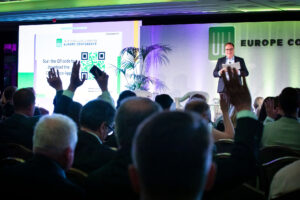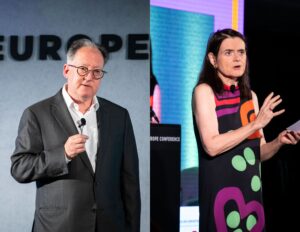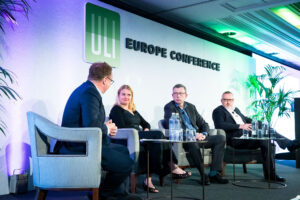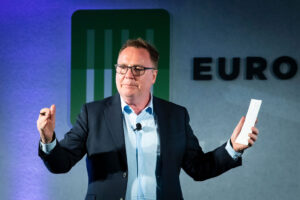Our conference moderator Prof Greg Clark CBE closed this year’s ULI Europe Conference in London with his reflections on the key topics under discussion.
It was my honour to host the main stage at the 2025 ULI Europe Annual Conference in London. I make 10 observations:

1. The global context could not have been more dramatic. Constitutional uncertainty, deportations, and protests in the USA; violent conflicts in Ukraine, Iran, Israel, Gaza, and Sudan; Chinese dominion of rare earth metals, and Europe seeking to champion growth, climate, and defence, whilst also tackling rising populism. The question of whether the US would bomb Iran to destroy its nuclear capabilities was live on the day.

2. This will be remembered as THE geo-political conference. And so it unfolded. Our two Geo-Political keynotes, joining us at opposite ends of the day, both attested the core message: this time it is different as Bronwen Maddox (CEO of Chatham House) advised, or as Gideon Rachman (Chief Foreign Affairs Commentator of the FT) observed, there have not been so many simultaneous conflicts, each with the scope for rapid multiplication and spillover, for many decades. This was deeply sobering.

3. Daniel Lacalle, our Economist keynote, took a different view. He saw the emergence of a new US economic agenda as a correction of recent malpractices, money printing with inflationary effects, massive public debt, no fiscal discipline, and unbalanced globalisation. He argued that the next 5-7 years will be great, and he focussed on the opportunities in India and China, the value of of Gold and Real Assets, and the promise of revised globalisation.

4. But before that, Lisette van Doorn (CEO of ULI Europe) enthused us with substantive progress on building a transparent platform and alliance to measure the true value, and true cost, of climate transition in real estate. In her opening speech Lisette made new meaning on the climate change / real estate nexus.

5. Our capital markets panel, brilliantly moderated by Anne Kavanagh (Chair of ULI Europe) picked up the key point: a time of trouble can also be window of opportunity. Can this be a moment of ‘comparative’ rather than ‘absolute’ advantage for Europe? The ‘flight to safety’ and ‘flight to quality’ dynamics are recognised. Europe may enjoy a welcome period of expansion for flows of talent, R&D, science, and, of course, capital. A positive framework for Real Estate investing can emerge, if wider conditions are right.

6. This moment of opportunity evolved in our conversion with Rebecca Dibb Simkin of Octopus Energy. Rebecca confirmed that it is now quite possible for households to enjoy zero cost power, with no energy bills to pay, ever. That happens when the home is well-equipped and insulated, and is connected to a network. The ‘portfolio effects’ of multiple homes sharing several systems for for producing, consuming, storing, using, buying and selling energy makes it possible. ‘Energy as a service’ has arrived, providing ‘transition as a service’ to those who subscribe.

7. James von Klemperer observed a similar ‘distributed network’ effect in the emergence of agile nimble (second tier) cities that are the emerging hubs of newly technology industries reinforced by high quality of life and ambitious urban retrofit.

8. This theme was picked up by Bob Jordan (Housing), Monica Magnussen (Climate) and Graeme Craig (Public Land) who each argued for practical and ambitious strategies for cities where public leaders galvanise new partnerships with land owners, investors, citizens, and technology. They argued for ‘people first’ agendas that will inspire citizen confidence and engagement.

9. Angela Cain, Global CEO at ULI, reminded us of the founding vision and value of ULI. The quest to treat urban land as different and special. It is land that has to be shared, with others, with the planet, and over time. It needs a special community to sustain it.

10. My highlight was the ULI delegates. Almost 800 people from 30 nations responded to 20 surveys and polls, created 4 word clouds and submitted more than 200 challenging questions to our esteemed speakers and panels. Something about the ULI crowd is unique. The span of expertise is rich; from architects, planners, and designers, to investors, developers and operators, not to mention the lawyers, bankers, and insurers, as well public officials, researchers, and professors. This mix gives ULI its magic. There is space to ask and to tell. There is no wrong question, and there is always more than one good answer.
What a gathering it was. The sobriety of the geopolitical context led to an intensity in the quest for meaning in what we do together. This reminded us of a deep truth. Making places where people feel free and safe, places where people can aspire and inspire, and places where people can do their best, is an antidote to the frenzied anxiety of global conflicts and climate instability. We need to make places and dwell in them. By making places we express a fundamental human instinct to set down roots, to flourish in common, and to become hospitable.
See you next year! The 2026 ULI Europe Conference will take place in Berlin. Further details coming soon.
Coming up: look our for our new series of thought leadership blogs on the key topics and talking points from ULI Europe Conference 2025.
All photography: Karla Gowlett/ULI









